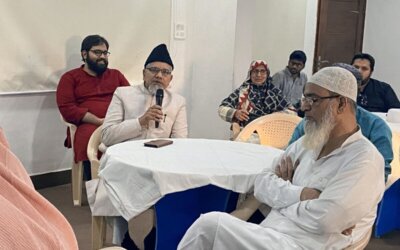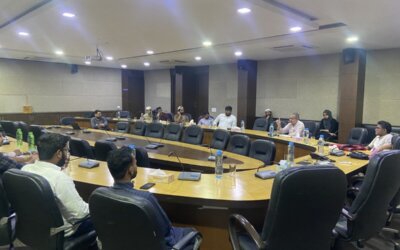
Prof. Anil sadgopal released the report on Sansad Mein Shiksha today at Constitution Club of India, New Delhi.
The round table conference was inaugurated with the address of Mr. Thouseef Madikeri (National Secretary SIO of India). He presented the idea behind the discussion on “Sansad Mein Shiksha” and what led SIO to compile a report on the theme. The report is based on discussions and debates of MPs in various sessions of parliament. With a review on policy formulation on education, it is found in the discussions that most of the questions raised were on survey reports (rather than on the structural and policy reforms). And most of these questions were repetitive which were already been answered in public forums. He also presented the analytical report on downfall of educational standards mentioning negligence towards education in mother tongue, minority educational institutions and intake of madarsa students in state universities. He argued that the government policies are not focused on grassroots issues.
Continuing the session Professor Anil Sadgopal, (a renowned educationalist, social activist and member of All India Forum for Right to Education) congratulated SIO on the report prepared and said that more than half the population of our nation comprises of students and the policies made are very choosy, giving benefits to few in number. He criticized closing of government institutions and approving the private institutions by giving financial security under RTE of 25% reservation with approximate budget of 50,000-60,000 Crores every year, instead government can spent this budget in developing government schools. Giving the example of Finland, he said that, it is a country whose Nokia phones are in our pockets today. This country had earlier faced a very critical condition of decline in educational standards; there government did not launch any schemes or not formed the commissions but they, instead, promoted the common schooling system. Due to this and such other reforms, in next 30 years, Finland was at top of the world in terms of its literacy rate. Where as in our country, Educational Reform Report of Ambani Birla was passed in parliament and has since been followed in all educational institutions giving benefits to the upper class. As per this philosophy the very purpose of education seems to be information and technology and not social values. He also said that large number of literate people in India are living in an illusion that government is making good policies but its execution is not proper, whereas the fact is that the policies made are completely against common people. We need to study and analyze the policies from different perspectives as SIO is trying to understand policy matters.
Professor Madhu Prasad said that the politics today is influenced with idea of Majoritarianism wherein democratic country every citizen must have equal rights safeguarded by its constitution. Raising a question that what is the need of Deenanath Bathra in educational policies, he is in no sense suitable for the job except being a member of RSS. She said that today the whole education seems to be coloured with Brahminvad and imposed on the – “lowered castes” as said by Dr. B. R. Ambedkar.
Concluding the session Mr. Laeeq Ahmed Khan Aqil (National Secretary, SIO of India) said that the discussion made in Sansad is quite disappointing. Many things which are included in the actual frameworks have not been discussed thoroughly in either public domain or in public representative forum (parliament). He raised a question: where all these matters were discussed and how these are implemented, we are suspicious about it. He also raised questions on growing communal polarization, socio-economic disparities, gender exploitation and imposition of cultural practices of one sect on the whole society which is damaging the plural and moral ethos of the nation and poses a great threat to people’s freedom and the very foundation of India. He also added that today government feigns that its governance is people-participatory in nature while this is not the case. For example, in the case of New Educational Policy Formulation – 2015 we see all administrative participation but participation of other stakeholders is very arbitrary. Also in the name of promoting morals and value based education, cultural imposition seems to happen in course curriculum, especially at schools level. Congratulating the participants for joining the mission of reforms in education he said that you are doing the task which Government and Administration is supposed to do. And these things happened in all transformative times, your struggle will surely change the situations.





0 Comments